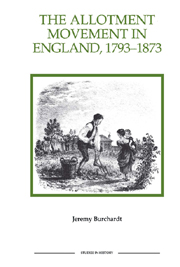Book contents
- Frontmatter
- Contents
- List of tables
- Acknowledgements
- Abbreviations
- Introduction
- PART I THE FIRST ALLOTMENT MOVEMENT
- PART II THE SECOND ALLOTMENT MOVEMENT
- PART III ALLOTMENTS AND RURAL SOCIETY
- PART IV TOWARDS THE THIRD ALLOTMENT MOVEMENT
- Conclusion
- 1 The allotments database
- 2 The origins and definition of allotments
- 3 Allotments and potato grounds
- 4 Legislative limits on plot size
- 5 Allotment plot size
- 6 Allotment rent
- 7 Animal-keeping on allotments
- 8 Allotment site rules
- Bibliography
- Index
3 - Allotments and potato grounds
Published online by Cambridge University Press: 12 September 2012
- Frontmatter
- Contents
- List of tables
- Acknowledgements
- Abbreviations
- Introduction
- PART I THE FIRST ALLOTMENT MOVEMENT
- PART II THE SECOND ALLOTMENT MOVEMENT
- PART III ALLOTMENTS AND RURAL SOCIETY
- PART IV TOWARDS THE THIRD ALLOTMENT MOVEMENT
- Conclusion
- 1 The allotments database
- 2 The origins and definition of allotments
- 3 Allotments and potato grounds
- 4 Legislative limits on plot size
- 5 Allotment plot size
- 6 Allotment rent
- 7 Animal-keeping on allotments
- 8 Allotment site rules
- Bibliography
- Index
Summary
Two articles on allotments in nineteenth-century England appeared in the Economic History Review in the late 1990s – the first by Boaz Moselle, and the second by John Archer. Both make some valuable observations, which are considered in the relevant sections of the main text of this book. However, Moselle and Archer differ sharply on several important points. The aim of this appendix is to demonstrate that these differences are attributable to the fact that neither author distinguishes between allotments and potato grounds, causing unnecessary historiographical confusion as a result.
The first major disagreement between the two authors is over the question of who let allotments. Moselle contends that
based on the testimony collected (and a certain degree of cynicism as to the frequency of philanthropy as a motive force) it seems that, at the least, subletting by farmers must have been the dominant source of allotments in a significant proportion of parishes, while in many others it would have co-existed with landlord and/or parish provision.
Archer, on the other hand, refers to the ‘misleading impression that is given [by Moselle] of the farmers being the main lessors of allotments’.
Secondly, Moselle and Archer disagree about the chronology of allotment provision. Moselle is rather vague about the dating of the rise of allotments. He states that ‘[a]lthough it is impossible to obtain exact figures, contemporary accounts make it clear that allotments, which were little known or used in the eighteenth century, did indeed spread rapidly in the first half of the nineteenth century’.
- Type
- Chapter
- Information
- The Allotment Movement in England, 1793–1873 , pp. 244 - 251Publisher: Boydell & BrewerPrint publication year: 2002



